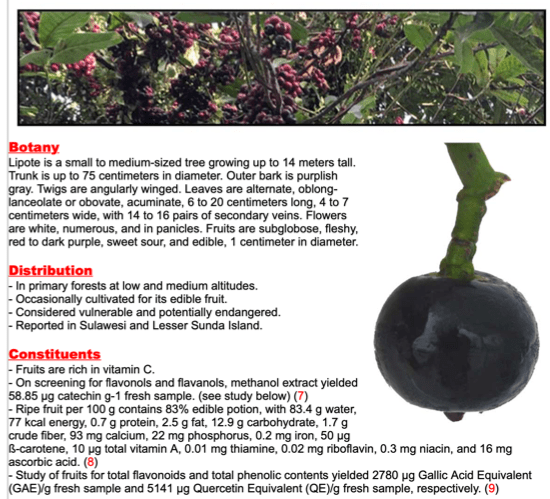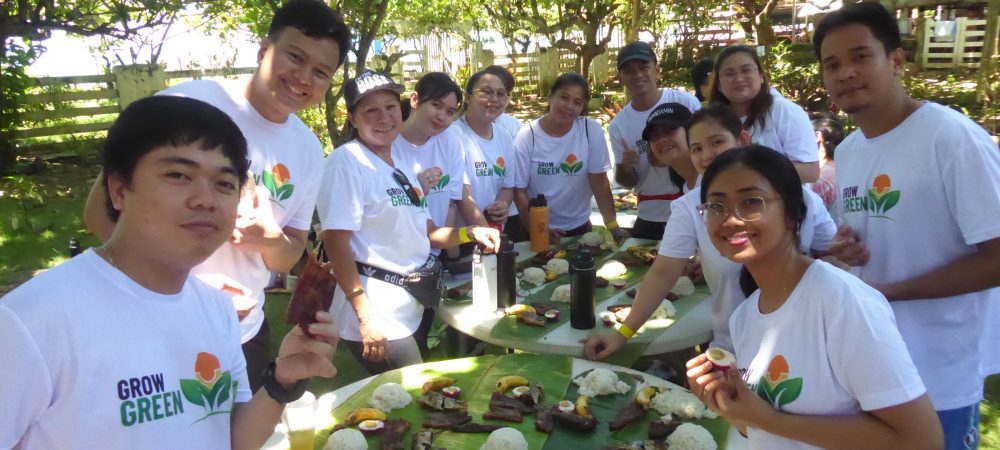2 February 2019, Siniloan, Laguna. The teams of PMFTC/PMPMI P&C Ops Asia’s “iCause” advocacy and the Jaime V. Ongpin Foundation’s “Embrace” program today planted 1,300 native Philippine forest trees in the Sierra Madre Mountains – adding to the 800 they already planted in 2018 – reaching their 2,020 by 2020 tree target well ahead of date.
The Siniloan, Laguna site is managed by FEED’s first and longest LIVING LEGACY partner, the Laguna Quezon Land Grant by the University of the Philippines Los Baños (UPLB). The location of the planting can be monitored remotely by anyone with access to GPS software and the following coordinates:
- 14° 29’ 15.54”N 121° 30’ 51.00”E
- 14° 29’ 14.51”N 121° 30’ 51.04”E
- 14° 29’ 15.38”N 121° 30’ 53.84”E
- 14° 29’ 14.82”N 121° 30’ 52.23”E
Photo Mosaic
List of Native Philippine Seedlings Planted
The species planted (with scientific name) and quantity are listed below, for a total of 1,300 planted today:
- 500 Malaruhat (Syzygium nitidum)
- 200 Bani (Pongamia pinnata)
- 200 Kalumpit (Terminalia microcarpa)
- 200 White lauan (Shorea contorta)
- 100 Bignay (Antidesma bunius)
- 100 Lipote (Syzygium polycephaloides)
Malaruhat (Syzygium nitidum)

Syzygium nitidum is a tree that can grow up to 25 metres tall. The tree is harvested from the wild for its wood.
Bani (Pongamia pinnata)

Fast-growing, medium-sized, evergreen or briefly deciduous, glabrous shrub or tree with a broad crown of spreading or drooping branches. It usually grows 15 – 25 metres tall. A multipurpose tree, it is particularly valued for its oil and also supplies dyestuff, wood, fuel, insect repellent, medicines and various other commodities. The tree is planted in the humid tropical and subtropical lowlands around the world as a pioneer and soil reclamation plant. This species is one of the few nitrogen-fixing trees to produce seeds containing oil, and these are collected in vast amounts in India for commercial processing of industrial uses. The tree is often planted in homesteads as an ornamental tree and in avenue plantings, roadsides, and along stream and canal banks. However, its large amounts of flowers, leaves and pods that it regularly sheds make it not suitable for this purpose.
Kalumpit (Terminalia microcarpa)

Semideciduous tree with a wide-spreading, semi-open crown, it can grow 10 – 40 metres tall. The straight, cylindrical bole can be unbranched for up to half the height of the tree, up to 200cm in diameter with buttresses at the base. The edible fruit is commonly gathered from the wild for local use, whilst the timber is a major exportable hardwood (in New Guinea). The tree also provides medicines and materials for local use. The tree is cultivated as a fruit crop on a home garden scale in the Philippines, where the fruit can sometimes be found for sale in local markets. The tree is sometimes used for avenue plantings.
White lauan (Shorea contorta)

Evergreen tree that can grow up to 50 metres tall. The tree is commonly harvested from the wild for its wood, which is traded internationally. The plant is classified as ‘Critically Endangered’ in the IUCN Red List of Threatened Species (2013).
Source of tree images and descriptions: tropical.theferns.info
Bignay (Antidesma bunius)

Antidesma bunius is a species of fruit tree in the Phyllanthaceae. It is native to Southeast Asia and northern Australia. Its common Philippine name and other names include bignay, bugnay or bignai, Chinese-laurel, Herbert River-cherry, Queensland-cherry, salamander-tree, wild cherry, and currant tree. Source: https://en.wikipedia.org/wiki/Antidesma_bunius
Lipote (Syzygium polycephaloides)

Small to medium-sized tree growing up to 14 meters tall. Outer bark is purplish gray. Twigs are angularly winged. Flowers are white, numerous, and in panicles. Fruits are subglobose, fleshy, red to dark purple, sweet sour, and edible, 1 centimeter in diameter. Found in primary forests at low and medium altitudes, occasionally cultivated for its edible fruit and considered vulnerable and potentially endangered. Source: http://www.stuartxchange.org/Lipote.html
Check out also the last planting P&C Services Asia and JVOFI carried out with FEED in 2018: “Planting in the Clouds”: 75 Brave EcoWarriors Face Galeforce Winds & Rains to Restore 800 Native Trees!
| 1 | Clarisse Anne Estolano | 10 | Liezl Cacafranca |
| 2 | Kimberly Nicole Ng | 11 | Cherie Yu |
| 3 | Cherryl L. Balaodan | 12 | Jennie Gavino |
| 4 | Flohelda C. Crispin | 13 | Michelle Lim |
| 5 | Jake M. Potennec | 14 | Babylyn Paguigan |
| 6 | Laila M. Sison | 15 | Adrian Orquiza |
| 7 | Amy Leigh G. Suclad | 16 | Trisha Tan |
| 8 | Jessemen Ng | 17 | Rosary Bombeta |
| 9 | Herwina Partosa |
Related Article:
About JVOFI

The Jaime V. Ongpin Foundation, Inc. was established on 17 December 1980 as a corporate social arm of Benguet Corporation. Originally called the BenguetCorp Foundation, its creation was inspired by the late Jaime V. Ongpin, the company’s first Filipino president, who envisioned the development of self -reliant communities in the areas where it operated.
A pioneer in the mining industry in the Philippines, Benguet Corporation operated the largest gold mines until the 1980s and the largest chromite mine in the country. Mr. Ongpin joined Benguet Corporation in 1962 and became President in 1974. He is credited for introducing corporate social responsibility as a major concern of top management down to the ranks. This was later institutionalized when he formed the Foundation in 1980.
The Foundation was initially tasked to attend to the needs of dependents of company employees which were not directly related to the Company’s business but nonetheless equally important to maintaining a productive workforce. The Foundation’s mandate later extended to the neighboring communities to enable them to transform into self-reliant communities that continue to thrive when the company’s mines cease to operate.
Mr. Ongpin eventually joined the cabinet of President Corazon Aquino in 1986 as the Minister of Finance. He later returned to private life and a few months after his death in 1987, BenguetCorp Foundation was renamed in his honor.
The Foundation became financially independent from the Company in 1997 and works in partnership with local and foreign donors, business, government agencies, other NGOs and people’s organizations. JVOFI is a non-stock, non-profit organization duly registered with the Securities and Exchange Commission. It is a certified donee institution until 2017 by the Philippine Council for NGO Certification and the Bureau of Internal Revenue.
Source: http://jvofi.org
CONTACT FEED
In 2015, the Philippine government submitted to the United Nations the country’s commitments to reduce greenhouse gas emissions. The country committed to reduce its carbon emissions by 70 percent by 2030. The carbon dioxide reductions will come from the sectors of energy, transport, waste, forestry and industry.
FEED runs a number of Students and Volunteers for the Environment (SAVE); Corporate Social Responsibility (CSR) – such as mangrove planting for coastal protection or ridge reforestation plantings; One Child, One Tree; Bio-Intensive Gardens (BIG) for nutrition in public elementary schools and other spaces; Climate Change Survival 101 and other LIVING LEGACY programs – customised environmental engagement activities for individuals and organisations interested in contributing to climate change adaptation efforts and greening critical areas such as watersheds, ridges, and reefs that all require rehabilitation.
Join us! Help us reverse the Earth’s “hothouse climate” tipping point.
Tree-Planting with FEED
Check out the video journey by Clueless Commuter who planted with us last 24th of June 2017 to get a good idea of how FEED plantings go: https://youtu.be/KROn4rjVqBg
Contact us at FEED for more details, to join our regular activities or to design your own tree-nurturing event: info@feed.org.ph or call/text +63 (0)917 552 4722 (Anne).
© Fostering Education & Environment for Development, Inc. 2019.








































































































